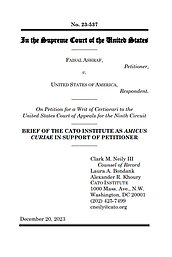Learn more about Cato’s Amicus Briefs Program.
Every American has a right to a jury trial when charged with a crime that carries a penalty of more than six months. But over 90% of convicted American prisoners never received one. Instead, they agreed to plead guilty pursuant to a deal struck with their prosecutors.
In today’s criminal justice system, the vast majority of convictions are obtained from guilty pleas, and constitutionally prescribed jury trials are vanishingly rare. As the federal prosecution of Faisal Ashraf for alleged computer crimes vividly illustrates, defendants sometimes plead guilty even when the case against them is highly flawed. The intense pressure to avoid the risk of decades-long sentences can even lead defendants to plead guilty to crimes they did not commit—or to crimes that do not exist. Federal appellate courts are divided over whether an appeal waiver contained in an arguably defective guilty plea is enforceable.
In 2013, Faisal Ashraf was indicted on federal wire-fraud charges in California. When Ashraf moved to dismiss the indictment, the government offered him a deal: plead guilty to several lesser charges under the Computer Fraud and Abuse Act (CFAA), the government would drop the wire-fraud charges. But there was a problem with the proposed plea: under existing case law Ashraf was not guilty of violating the CFAA.
Correctly concerned that Ashraf’s legally baseless guilty plea would be overturned on appeal, prosecutors insisted that Ashraf waive is right to appeal. After his guilty plea was entered, the Supreme Court issued a decision further clarifying that Ashraf’s conduct did not violate the CFAA. Ashraf sought to appeal his conviction, but the government argued that the appeal was barred by the waiver that Ashraf had “agreed” to as part of his plea. Incredibly, the Ninth Circuit denied review, explaining that Ashraf “knew his admitted conduct was arguably noncriminal and chose to waive [that] argument and plead guilty.”
In support of Ashraf’s cert petition to the Supreme Court, Cato filed an amicus brief advancing three distinct arguments for why the Court should take Ashraf’s case. First, plea bargaining merits an amount of judicial scrutiny commensurate with the outsized role it plays in our criminal justice system. As noted, the vast majority of criminal convictions are obtained through guilty pleas. Nevertheless, the Supreme Court has heard only two cases involving challenges to some aspect of the plea process since 2017. The Court should not shy away from examining the process by which most American prisoners are convicted.
Second, we argue that courts should not adopt procedures that enable the government to convict people of crimes they did not commit. This concern is especially important against the backdrop of increased polarization and Americans’ diminishing confidence in institutions.
Finally, Cato’s amicus brief maintains that when a defendant’s alleged conduct does not constitute a crime, there is no “case or controversy,” and the federal courts therefore lack jurisdiction to hear the case at all—let alone convict and sentence the defendant.
It makes no difference whether a conviction comes from a jury or a plea bargain—appellate review must always be available to reverse convictions when the conduct at issue is not a crime. The Supreme Court should take this case and reverse the Ninth Circuit.

This work is licensed under a Creative Commons Attribution-NonCommercial-ShareAlike 4.0 International License.

